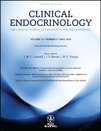Effects of octreotide exposure during pregnancy in acromegaly
Summary
Background Only six women who were treated with somatostatin analogues (SSAs) throughout their pregnancies have been described so far. The influence of SSAs on the course of pregnancy and newborn outcomes remains largely unknown. Many aspects of SSAs pharmacokinetics in mother and foetus have not yet been defined.
Methods and findings We report a case study on the effects of octreotide on uterine artery blood flow, octreotide concentrations in biological fluids of mother and newborn, and somatostatin (SST) receptor expression and binding at the level of the maternal–foetal barrier tissues in an acromegalic woman treated with short-acting octreotide throughout her pregnancy. An acute decrease in uterine artery blood flow was observed after octreotide injections, without affecting the pregnancy course, delivery, or foetal development. Octreotide concentrations were high in maternal serum and colostrum and lower in umbilical cord serum, amniotic fluid, and newborn serum. All SST receptor subtypes can be expressed in placental tissue but their binding profile was weak both in the placenta and umbilical cord. The child was healthy and developed normally up to age 6 from an anthropometric, metabolic, and endocrine point of view. We reviewed all published reports on pregnancy SSA exposure and outcomes were compared to a time-matched group of acromegalic women not exposed to SSA. No significant effect on the mother or foetus was observed.
Conclusions Short-acting octreotide appears not to affect the function of the maternal–foetal barrier or foetal development, except for the occurrence of acute, reversible, and clinically irrelevant haemodynamic changes. These data support the feasibility and safety of treatment with short-acting octreotide in acromegalic women during pregnancy and excludes major matters of concern about the effects of this medication on pregnancy itself and its outcome.




